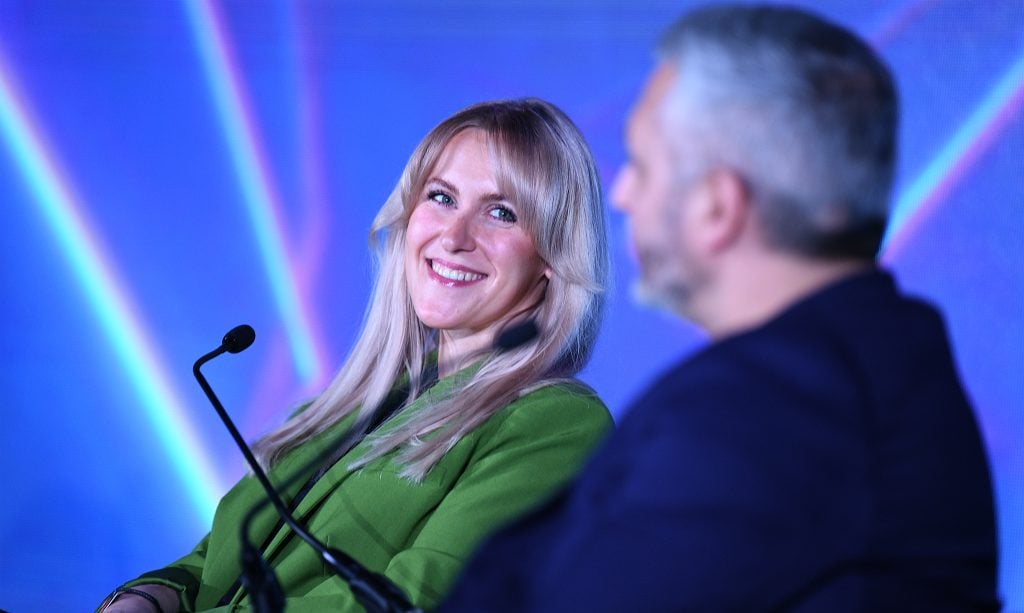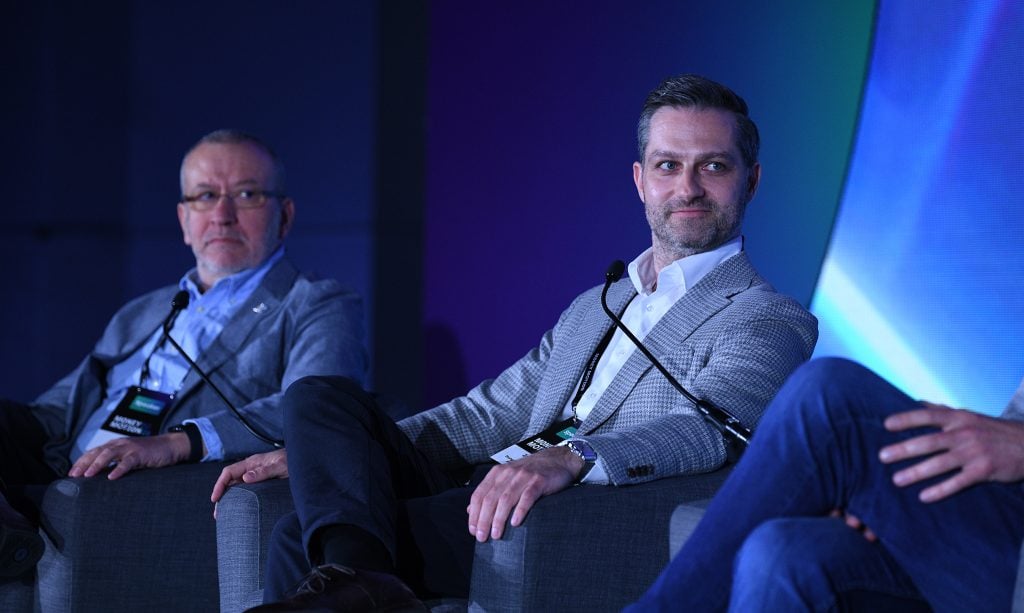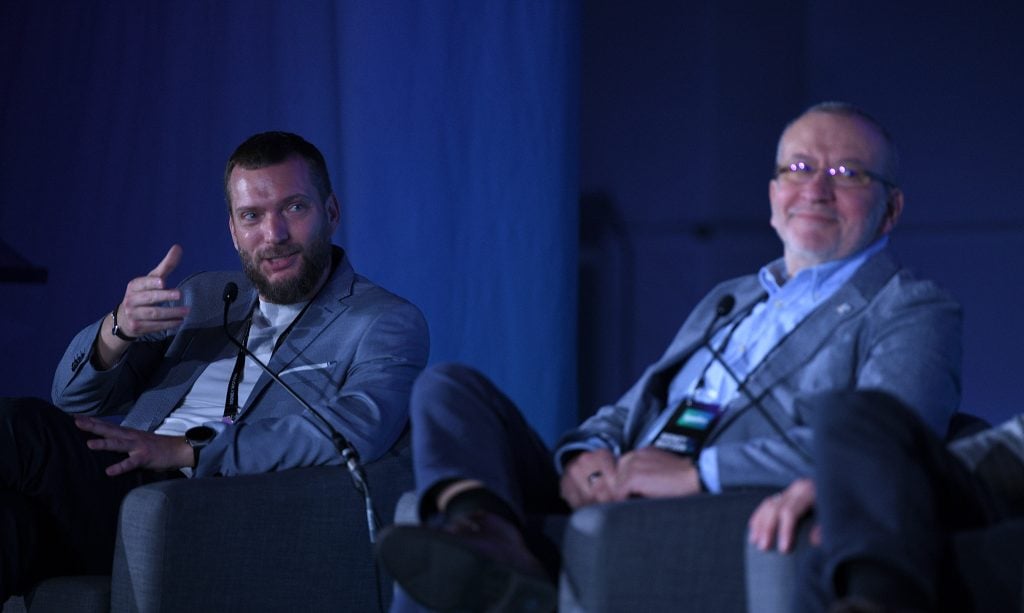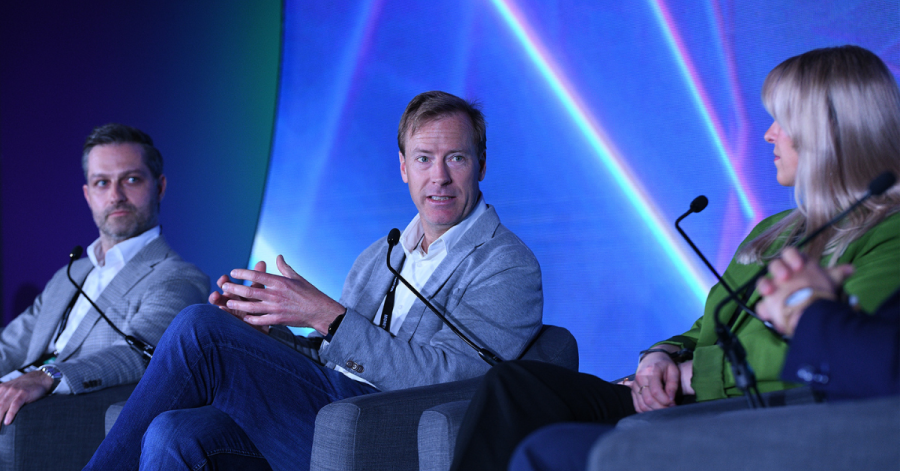“It seems to me that this single market is not really functioning at all. We see a lot of initiatives from the European Commission and the European Central Bank, but many of them come from the top down, rather than solving the real problems fintechs face.” This remark by Nikola Škorić, CEO of Electrocoin and one of the organizers of Money Motion 2025, captured a key tension running through one of the conference’s most critical discussions.
The Money Motion 2025 fintech conference, held in Zagreb, gathered key figures from across Europe’s fintech landscape for a pivotal panel on the realities of scaling, regulation, and cross-border collaboration in the industry.
Moderated by Alex Panican, Deputy CEO of the Luxembourg House of Financial Technology, the conversation featured key voices in the European fintech space, including:
- Don Ginsel, Chair of the European Digital Finance Association
- Nikola Škorić, CEO of Electrocoin
- Alice Rettig, Managing Director of TechQuartier FinTech Community Frankfurt
- Zoltán Ács, Chairman at the Hungarian Fintech Association
- Nic Balaceanu, Board Member at Romanian Fintech Association
Photo: Nina Đurđević | Money Motion 2025

In an industry where market fragmentation, regulatory complexity, and access to capital continue to pose major challenges, the discussion was far from unanimous, highlighting just how critical—and unresolved—some issues remain.
Where does (Central & Eastern) European fintech stand?
A central theme of the discussion was Europe’s position in the global fintech race. While it is known for its strong regulatory framework and financial stability, concerns were raised about whether this helps in keeping pace with the US and China.
Meanwhile, the panel gave us a better glimpse at the fintech ecosystems in Croatia, Germany, Romania, Hungary, and the broader European Union. Each presents distinct characteristics shaped by local regulatory, market, and investment conditions.
Croatia’s fintech ecosystem is relatively small, but it has seen important developments. Nikola Škorić, CEO of Electrocoin, explained that while the market size is limited (around 30 fintechs), it includes a broad range of segments such as open banking, payments, and crypto. One of the significant recent developments in Croatia was the creation of a fintech hub, which will be established through a collaboration between ZICER, the Croatian Postal Bank, and the Faculty of Economic Sciences.
On the other spectrum, Germany’s fintech ecosystem is one of the most developed in Europe. Alice Rettig, Managing Director of TechQuartier, emphasized that Germany has a strong integration of fintech startups with large corporations, particularly banks and insurance companies.
TechQuartier, based in Frankfurt, with 700+ fintech under its umbrella, plays an integral role in this collaboration by facilitating partnerships and incubation programs to support fintech growth.

Nic Balaceanu, a board member of the Romanian Fintech Association, pointed out that there are few hundred active fintechs in Romania, although only 25 in the association. Romania’s fintech ecosystem is still maturing, but it benefits from a strong IT infrastructure and a highly skilled workforce, making it an attractive destination for fintech development.
Hungary’s fintech ecosystem is home to over 200+ fintech companies, although only around 50-60 of these are startups. Zoltán Ács, Chairman of the Hungarian Fintech Association, mentioned how they are working with the Hungarian Central Bank to position the Hungarian fintech ecosystem as a gateway to the European Union. Through partnerships with non-EU countries such as Turkey, Singapore, and Dubai…
Regulation: A double-edged sword
At the broader European level, Don Ginsel, Chair of the European Digital Finance Association, discussed the regulatory fragmentation across the continent, which presents a significant challenge for fintechs aiming to scale. While the EU has made efforts to create a single digital market, different regulations in each member state make it difficult for fintech companies to expand beyond their national borders.
At the same time, Europe has gained a reputation for setting the gold standard in regulation, with many countries outside the EU adopting similar frameworks. Zoltán Ács pointed out:
“When I travel outside the European Union, I see our regulations being copied. That’s something to be proud of.”

Regulatory frameworks were a recurring topic. While some panelists argued that clear rules create stability and trust in the market, others warned of excessive bureaucracy hindering fintech startups.
Nic Balaceanu thinks that regulations can unite us, the end goal being that, for example, a Romanian fintech owner can easily do business in Croatia. Zoltan and Nikola countered that regulations are politicized and are not uniting us, citing examples how it in fact complicates doing business.
Acknowleding that, Nic reitarated that regulation shouldn’t be forsaken, but should be done faster and in more clear way. Alice Rettig highlighted the balance needed, stating, “We use regulations as a business model. If done right, it creates stability and trust. But we must ensure it doesn’t become a barrier.”
Don Ginsel concluded that we must convince Brussels fintechs have to survive. Otherwise, we won’t have a thriving financial ecosystem.
Big Tech and traditional banks
Fintech startups not only face regulatory hurdles but also pressures from other players in the space. Some panelists argued that European policymakers had historically been too lenient toward US tech giants.
Ginsel observed, “For years, we gave “red carpet” treatment to American companies, because they felt like part of our ecosystem.” Luckily, we see that is changing.
Meanwhile, banks remain deeply entrenched in the financial system, making it more difficult for fintech startups to advocate for changes. Škorić noted:
“Big banks have been around for 200 years, and they’ll be here for 200 more. That is their mindset. If we want to push regulators – we, the fintechs, need to organize ourselves. That is why I called you here – to meet up and keep in touch on the matters.”

Despite these challenges, there was optimism in working with banks in general. As core banking systems undergo digital transformations, fintechs are finding more opportunities to integrate their services. Rettig remarked, “The market is evolving. Fintech companies that can plug into the banking system efficiently will have a competitive advantage.”
Scaling european fintech
Ács pointed out that, while Europe is larger than the US in population, “the lack of a single, unified financial system creates barriers to expansion.” Ginsel remarked that we still have a lot to learn from US companies. “Their approach to scaling and problem-solving is something we should study closely.”
Market differences also play a role. Škorić commented:
“The way we experience money is different country by country. That makes it harder to build one-size-fits-all solutions.”
However, as fintech companies become more adept at navigating regulatory differences, many believe the European market will become easier to scale. For that matter, several panelists stressed the importance of cross-border collaboration to overcome those challenges.
A Call to Action: Building a stronger fintech ecosystem
The discussion ended with several speakers inviting fintech founders to explore opportunities in different European markets:
- Nic Balaceanu (Romania): “Come to Romania—we have the infrastructure and the right size for scaling fintech businesses.”
- Zoltán Ács (Hungary): “We are building a fintech bridge between Asia and the West in Budapest—everyone is welcome.”
- Nikola Škorić (Croatia): “Come to Croatia —we have cookies… and a fintech association to build together!”
- Don Ginsel (EDFA) mentioned they are visiting all the major fintech events far and wide – so he invited to meetup wherever you can.
Ultimately, the conversation highlighted both the challenges and opportunities facing European fintech. While regulatory complexity and competition remain obstacles, Europe’s fintech leaders are committed to collaboration.
Alex Panican concluded with a unifying message: “We need to stay united. We may not have the capital of the US or the scale of China, but we have a unique ecosystem. If we work together, we can shape the future of fintech—not just in Europe, but worldwide.”
The conversation doesn’t stop here—be part of the next chapter! Tickets for Money Motion 2026 are already available. Secure yours now and join in shaping the future of European fintech!







